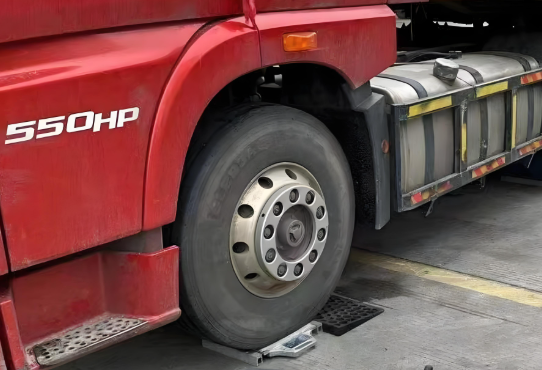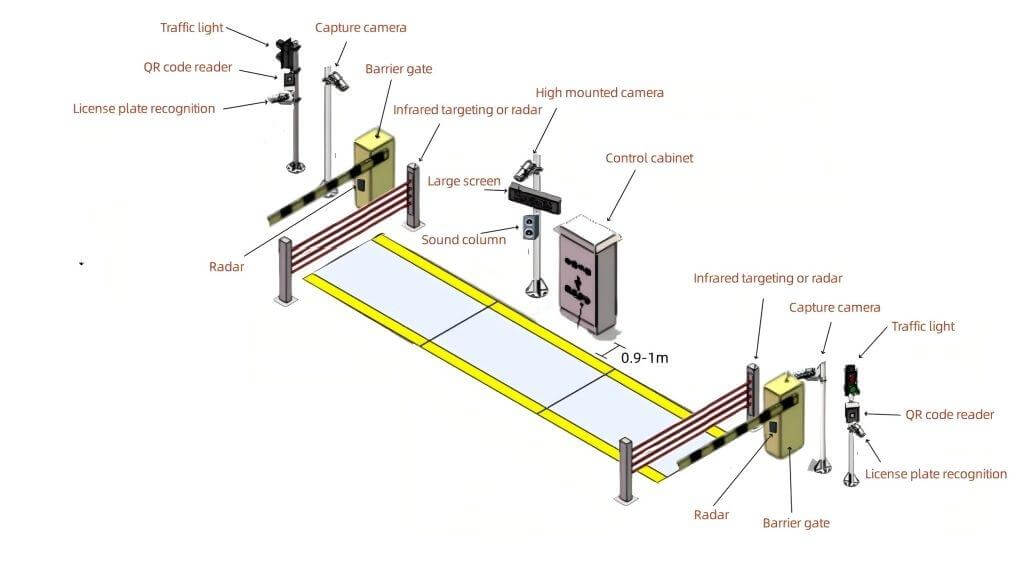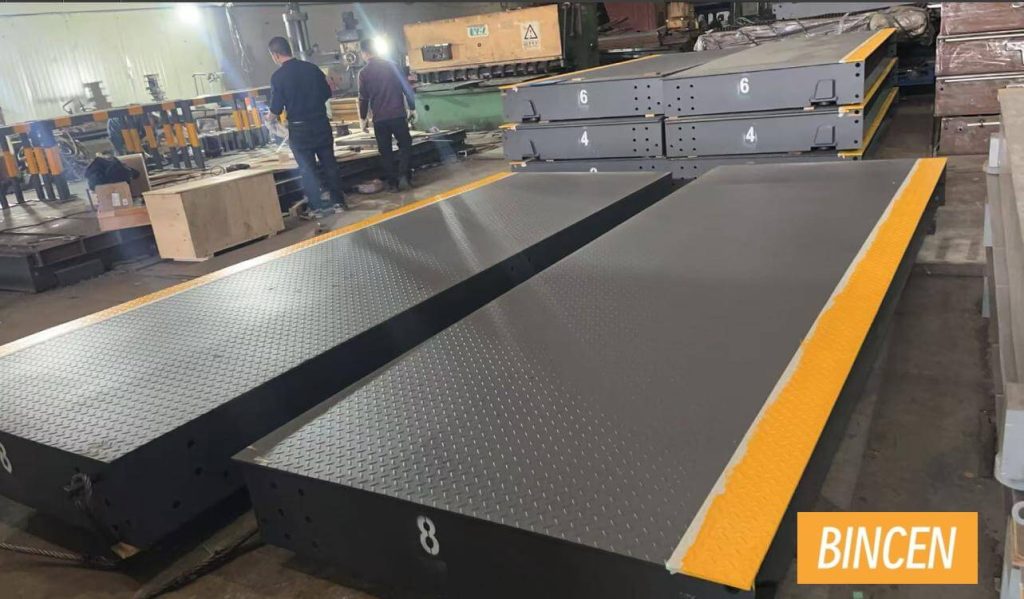Why Do Trucks Have to Be Weighed?
Truck transportation is the backbone of the global logistics industry, with thousands of trucks traveling on highways every day, transporting various goods.
However, have you ever wondered why do trucks have to be weighed? Whether it’s for driver safety, road safety, legal compliance, or protecting infrastructure, truck weighing is essential. In this article, we will explore in detail the importance of truck weighing and the common methods used for weighing.

Part 1. Why are Trucks Weighed?
Trucks are weighed for many reasons, for instance, safety, taxes, profits, etc. Each of these factors plays a crucial role in the efficient and compliant operation of the transportation and logistics industry. Let’s explore these reasons in detail:
1. Safety
Safety is the primary reason why trucks are weighed. Overloaded trucks can create dangerous driving conditions not just for the truck driver, but for other road users as well.
Excessive weight affects a truck’s stability, braking distance, and maneuverability. Trucks that are too heavy or poorly loaded are more likely to experience tire blowouts, mechanical failures, or even accidents due to poor control.
Driver safety: Driver and Other Road Users’ Safety: Overloaded trucks can make vehicles harder to control, especially in bad weather or on steep slopes, increasing the risk of accidents.
When an accident occurs, it not only results in injury to the driver but also poses a threat to pedestrians, other road users, as well as cause damage to the surrounding environment.
Road damage: Overloaded trucks can also cause severe damage to road infrastructure, including highways, bridges, and tunnels. When trucks exceed the maximum allowable weight, they impose excessive pressure on road surfaces, leading to cracks, potholes, and quicker deterioration.
Vehicle wear and tear: Overloading can damage critical vehicle components such as suspension systems, tires, and brakes, leading to costly repairs and reducing the truck’s operational lifespan.
Weighing trucks helps ensure they are within safe weight limits to prevent accidents and enhance road safety for everyone.

2. Taxes
In many countries, truck weight directly influence how much businesses are taxed for transportation activities. Heavier trucks are often subject to higher tolls, fees, or taxes because they cause more wear on public roads. Governments use truck scales to ensure that companies comply with weight restrictions to maintain fair use of infrastructure.
Road usage fees: Truck weight determines the tolls or taxes companies must pay for using highways and bridges. Heavier trucks typically incur higher fees because they impose greater strain on public roads, requiring more maintenance and repairs.
Compliance with regulations: Governments set maximum weight limits to protect infrastructure and the environment. Truck scales are used at weigh stations to ensure that vehicles comply with these limits. Companies that exceed weight limits can face penalties or legal action, making it vital for businesses to weigh trucks to avoid costly fines.
By weighing trucks, authorities ensure that businesses adhere to weight regulations, which helps fund road repairs and keeps infrastructure in good condition.
3. Profits
While safety and compliance are the main concerns, weighing trucks also directly impacts the profitability of transportation businesses.
Maximizing cargo: Knowing the exact weight of a truck allows businesses to maximize the load without exceeding weight limits, optimizing transport efficiency. A properly loaded truck can carry the maximum weight allowed, ensuring that the business is getting the most out of each trip.
Fuel efficiency: Overloaded trucks consume more fuel due to increased drag and strain on the engine. Weighing trucks ensures they are within the optimal weight range, leading to better fuel efficiency and lower operating costs. Companies that effectively manage fuel consumption can significantly reduce their operating expenses.
Preventing fines: Avoiding penalties for overloading is another way that weighing trucks contributes to profitability. Fines for exceeding weight limits can be hefty and may include legal costs, loss of business, or damage to the company’s reputation. By weighing trucks before each trip, companies reduce the risk of fines and legal issues.
Weighing trucks enables businesses to operate more efficiently by maximizing load capacity, minimizing operational costs, and avoiding fines. By balancing safety, compliance, and efficiency, companies can boost profits and maintain sustainable business practices.

Part 2. Common Ways to Weigh Trucks
Weighing trucks is essential to ensure compliance with weight regulations, improve safety, and optimize transport operations. There are several methods commonly used to weigh trucks, each offering different benefits depending on the business needs or regulatory requirements.
1. Truck Scales
Truck scales are one of the most widely used methods for weighing trucks. These scales consist of large, flat platforms that can support the entire weight of a truck, including cargo. They work by using load cells, which are sensors that measure the weight applied to the scale.
Advantages:
- High accuracy: Electronic truck scales provide precise weight measurements, which are essential for compliance and safety.
- Versatility: They can weigh a wide range of vehicles, including trucks, trailers, and buses.
- Data recording: Many electronic scales come with software that allows for data storage and reporting, making it easy to track the weight of multiple vehicles over time.

2. Weigh-in-Motion (WIM) Systems
Weigh-in-motion systems (WIM) are a more advanced technology designed for weighing trucks as they drive over a sensor-equipped road surface. WIM systems are typically used in high-traffic areas such as highways, toll booths, or weigh stations to quickly and efficiently measure the weight of trucks without requiring them to stop.
Advantages:
- Efficiency: WIM systems can measure the weight of a truck while it is moving, allowing for faster processing of vehicles in busy areas.
- Non-intrusive: Trucks do not need to stop to be weighed, which reduces congestion and keeps traffic flowing smoothly.
- Cost-effective: WIM systems can reduce the need for additional staff or equipment that would typically be required for manual truck weighing.
3. Portable Axle Scales
Portable axle scales are smaller and movable scales designed to measure the weight on individual axles in a truck. These scales are often used at roadside inspections, weigh stations, or construction sites to check for compliance with axle load limits.
Advantages:
- Portability: They are compact and easy to transport, making them ideal for temporary or on-the-go weighing needs.
- Flexibility: Portable axle scales can be used at multiple locations, allowing for flexibility in monitoring truck weights.
- Quick setup: These scales can be quickly set up and used, making them ideal for inspections or on-site applications.

4. Bridge Weighing Systems
Bridge weighing systems are used to weigh trucks on bridges or overpasses as they cross. These systems are often installed at toll booths or check points where trucks must pass through, providing a continuous method of monitoring truck weight.
Advantages:
- Continuous monitoring: Since the truck is weighed as it crosses the bridge, it allows for continuous and automated monitoring of truck weights.
- Prevents delays: Trucks do not need to stop, allowing traffic to move without delays.
- Increased compliance: They help enforce weight limits by ensuring trucks that pass through are within the legal weight restrictions.
5. Static Weighing Stations
Static weighing stations are fixed locations where trucks stop to be weighed on a large scale, often in combination with visual inspections. These stations are commonly found at weigh stations along highways or near ports and industrial areas.
Advantages:
- Accuracy: Static weighing provides highly accurate weight readings because the truck is stationary during the weighing process.
- Regulatory compliance: Weigh stations are often used by regulatory authorities to ensure that trucks comply with local and international weight regulations.
- Detailed data: Many weigh stations are equipped with additional technology to capture detailed data on the truck’s weight, axle loads, and even cargo.

Part 3. How Bincen Can Help in Truck Weighing?
Bincen is a leading manufacturer of high-quality weighing equipment and systems, specializing in truck scales, weighbridges, various types of scales, and integrated weighing solutions.
Using advanced technology, Bincen delivers precise, reliable, and efficient weighing systems tailored to industries such as transportation, logistics, and manufacturing. The company offers both standard and custom solutions to ensure regulatory compliance, optimize operational efficiency, and enhance safety.

How Bincen Can Help?
Accurate and Reliable Weighing
Bincen’s advanced technology ensures precise and consistent weighing, reducing errors and enhancing the accuracy of measurements for various applications.
Compliance with Regulations
Bincen’s products are designed to meet industry standards and legal requirements, helping businesses stay compliant with local and international weight regulations.
Customized Solutions
Whether your operation requires standard systems or custom-built solutions, Bincen tailors its equipment to fit your specific needs, ensuring maximum efficiency and performance in any environment.
Excellent Pre-sales and After-sales Service
Bincen offers expert guidance during the pre-sales phase to help choose the right solutions and provide reliable after-sales support, including maintenance and troubleshooting, to ensure smooth and efficient operation of equipment.
In Summary
Truck weighing is a crucial aspect of transportation, and both truck drivers and transportation companies should actively ensure accurate weighing. If you are a transportation company or business in need of truck weighing equipment, Bincen offers high-precision, highly reliable weighing devices that will ensure your operations are compliant, safe, and efficient.
FAQs about Weighing Trucks
How often do truck drivers have to weigh their trucks?
Truck drivers must weigh their trucks at weigh stations as required by regulations, which vary by route and load. Some trucks may also weigh in before or after trips for compliance.
Why do some trucks not have to stop at weigh stations?
Some trucks don’t have to stop at weigh stations because they are equipped with bypass systems, such as PrePass or PreClear, which use transponders to communicate with the weigh station’s automated system.
These trucks are automatically weighed and inspected without stopping if they meet weight and safety criteria, streamlining the process and reducing delays for compliant vehicles.
Why do trucks have to be weighed at weigh station?
Trucks are weighed at weigh stations to ensure they comply with legal weight limits, which helps protect road safety, prevent infrastructure damage, and maintain fair competition.
What happens if a truck is overweight at a weigh station?
If a truck is overweight at a weigh station, the driver may face fines, be required to offload cargo, or have the truck detained until it meets weight limits. Repeated violations can lead to more severe penalties or suspension of permits.
What are the laws and regulations of truck weighing?
Different regions have specific weight limits; for instance, in the U.S., the total weight of a truck is typically limited to 80,000 pounds (about 36,287 kilograms).





